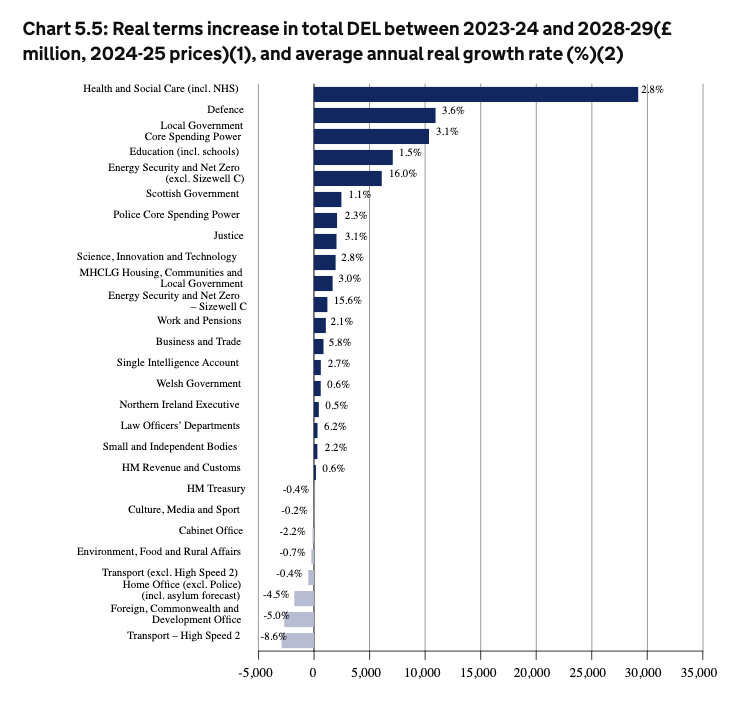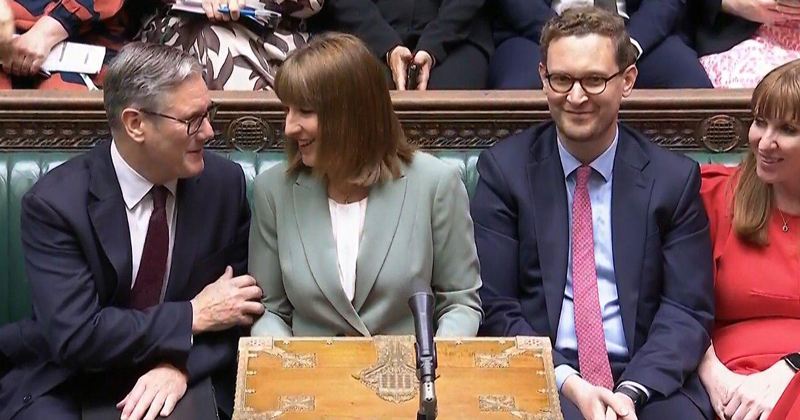The chancellor has set out government spending plans for the next three years, boosting the schools budget, extending the rebuilding programme and increasing Ofsted’s funding.
But the school funding increase will only amount to a roughly 1 per cent average real-terms increase to per-pupil funding each year (read our news story on that here).
It also has to cover cash for SEND reforms, the free school meals expansion and next year’s pay award.
Here’s what you need to know.
1. £4.7bn for schools, but just 1% per-pupil funding rise
Documents confirm the core schools budget will increase from £64.8 billion this year to £69.5 billion in 2028, a cash-terms increase of £4.7 billion by the end of the spending review period.
However, this includes the £410 million annual cost of the recently announced extension of free school meals, and the £615 million allocated earlier in the spring to contribute to next year’s 4 per cent teacher pay rise.
Some of it will also go towards SEND reforms (see point 2 below).
Once schools’ rising costs are taken into account, the injection works out as a 1.1 per cent average annual real-terms increase over the spending review.
However, if you exclude the free school meals cash, which is effectively already ringfenced, the average annual per-pupil funding rise will be 0.9 per cent in real terms.
When looking at the schools budget overall, the rise equates to just 0.4 per cent in real-terms over the spending review period.
And once the free school meals expansion cash is excluded, “you get a real-terms freeze in the budget”, said Paul Johnson, director of the Institute of Fiscal Studies.
However, pupil numbers overall are now falling, which “would in principle allow a rise in spending per pupil”, he added.
The government has also described the rise in funding as a £2 billion “real-terms” increase, but this is using 2023-24, the year before the election, as a baseline, so is misleading.
Unions have welcomed the “small” increase, but said schools will still face difficult decisions in the short term.
2. … but SEND rise means this could become real-terms freeze
The Treasury documents also state that the government has set aside £760 million for “reform of the SEND system”, with most of this falling in the 2026-27 year.
This comes from the £3.25 billion public services “transformation fund”.
However, the DfE confirmed to Schools Week that this money is part of the increase in the core schools budget.
This, alongside the continued rise in the number of pupils with special needs, could actually mean “the best schools could hope for is a real-terms freeze in mainstream school funding per pupil”, Luke Sibieta, from the Institute for Fiscal Studies, said.
It is also expected that the government will need to provide more funding for its SEND reforms, with councils pushing for high-needs deficits to be wiped.
The DfE has said the £760 million is just “one part of the investment government will make in SEND reform, not the entirety”.
3. Schools white paper in autumn (and not just for SEND)
The government will set out its SEND reform plans in a schools white paper, to be published in the autumn.
The reforms will “make the system more inclusive and improve outcomes for all children and young people”, the documents claimed.
“The government will also set out further details on supporting local authorities as the government transitions to a reformed system as part of the upcoming local government funding reform consultation,” the Treasury added.
But Schools Week also understands that the white paper will be broader than just SEND, and include wider school reforms.
4. More rebuilding cash, and scheme extended …
The government has already committed to ramping up the school rebuilding programme, which was slow in its first few years. Spending this year was due to be around £1.4 billion.
Today’s documents show government expects to spend around £2.4 billion per year for the programme over the spending review period.
When the SRP was announced in 2021, it was due to be a 10-year programme to rebuild around 500 schools.
The government said today that as part of its 10 year infrastructure strategy, it will “also commit to expand the programme, providing long-term certainty out to 2034-35”.
However, it has not said how many schools will now be targeted.
5. … and maintenance cash to rise
Spending on school maintenance and repairs will also rise by around £400 million to around £2.3 billion a year by 2029-30.
However, the document said this rise was only “in line with inflation”.
Meanwhile, around £2.6 billion will be spent from 2026‑27 to 2029-30 to fund “provision of mainstream school places needed to meet future demographic needs”.
In 2021, the spending review allocated the same amount of money for new provision – which was focused on places for children with SEND.
Sibieta said the increase in school capital spending overall equated to a 7 per cent real-terms increase, which reversed real-terms cuts since 2015.
6. Ofsted funding boost for MAT inspections
Despite reports Ofsted was unlikely to secure more cash at the spending review, documents show its budget will rise from just under £140 million in 2025-26, to nearly £159.4 million in 2026-27.
This will fund the inspectorate to “support the government’s mission to break down barriers to opportunity, including developing and implementing multi-academy trust inspections to increase accountability of MAT leaders”, the Treasury documents stated.
It’s not clear exactly how much extra this is, as Ofsted’s budget was actually £148 million in 2024-25, and will also fall back down to £153 million in 2028-29.
No further details have been provided on what the cash will go towards.
But Lynsey Holzer, CEO of The Active Learning Trust, said the choice of funding of projects “doesn’t feel like it hangs together in terms of a well understood strategy from the government”.
She said it “would seem interesting timing, since we still don’t have clarity on the new schedule for school inspections, so funding a second stream may be a moot point
7. No more info on 6,500 teachers pledge
Labour has pledged to recruit an additional 6,500 specialist teachers to shortage subjects by the end of this Parliament, and recently confirmed this would not include primary teachers.
The DfE’s permanent secretary Susan Acland-Hood recently told an education committee “fine detail” of the policy would only be announced following the spending review.
But the documents mention the pledge only once, stating that the settlement for schools and colleges “supports the government’s commitment to recruit 6,500 more teachers over the course of this Parliament across secondary schools, further education settings and specialist schools”.
8. Nurseries and libraries cash
The government has also confirmed it has allocated £370 million across four years to deliver more school-based nurseries in spare primary classrooms. The DfE previously announced £37 million for the first tranche of projects.
Ministers have also allocated £132.5 million of “dormant assets” to invest in school libraries and facilities to “support disadvantaged young people to access music, sport, and drama”.
9. How did the DfE budget fare?
Overall, the DfE’s total budget will increase to £109.2 billion by 2028, “equivalent to an annual average real terms increase of 1.5 per cent”, the documents show.
That 1.5 per cent rise puts the DfE behind most other areas of spending.
For example, spending on energy security and net zero is rising by 16 per cent, the law officers’ departments are getting a 6.2 per cent boost and business and trade is getting 5.8 per cent.
However, it’s worth pointing out the DfE has a much larger overall budget than many other government departments. Just looking at cash amounts, education got the fourth highest increase of all departments.
But, according to the Treasury documents, the DfE’s administration budget will drop by 15 per cent over the spending review period to £490 million.

















Your thoughts